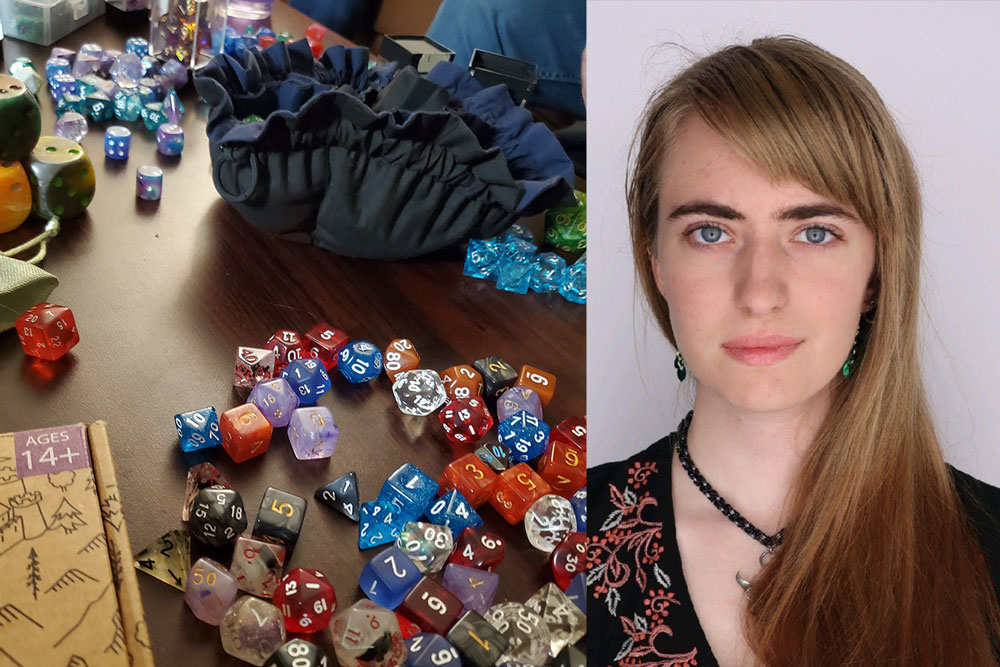Student explores tabletop roleplaying games as a simulated model for social relationships
Kathryn Sullivan ‘24 utilizes her love for TTRPGs like Dungeons & Dragons to explore the psychological and emotional responses of players engaging in a fantastical setting.

Student explores tabletop roleplaying games as a simulated model for social relationships
Tabletop roleplaying games (TTRPGs) are a popular way for people to spend time together. They could be lifelong friends or acquaintances and can still enjoy the diverse selection of games. Kathryn Sullivan, a senior triple major in Creative Writing, Professional Writing, and Anthropology, is analyzing the ways in which people discover more about themselves and their relationships with others while playing TTRPGs.
For her Undergraduate Summer Scholar research project, Sullivan used her love of TTRPGs to analyze the relationships that players create with others to set up a safe space for everyone. This allows audiences and actors alike to understand real-world dynamics and relationships through a synthetic stage of play.
“My goal is to examine the social interactions both in-game and at the table between players, how players use the game to both express themselves within it, to explore ideas of identity, either theirs or others, and to practice expressing themselves both in and around the game,” Sullivan said.
Her inspiration for this topic is her love for Dungeons & Dragons (D&D), fantasy, and games in general. When playing D&D, she likes to include aspects of her own identity, as well as aspects of an identity she doesn’t possess within the characters she plays, so that she can broaden her perspective and expose herself to new scenarios.
“That idea of alibis, the distance between the person and the character can help work through some of those topics. because if you know your character's the one who is suffering through it and having to relive it, you can pretend it's not you for a moment, and that distance can help work through things.”
Examples of characters dealing with complex issues, such as fatherly relationships, offer players a platform to explore and understand these relationships from both sides. TTRPGs provide a unique means of working through personal issues, all while maintaining a certain distance from one's true self, which Sullivan refers to as “a sort of therapeutic alibi.”
Noting the valuable experiences these roleplaying games could offer people, it's not a surprise that experts have already utilized TTRPGs to study relationships and roles that could be beneficial for their patients and others.
“I talked with a therapist and clinician who actually uses TTRPGs to help couples understand each other’s perspectives and break down the ice and work with each other,” Sullivan said.
One of her mentors for this project is James Bielo, a former Anthropology professor at Miami, who allowed her to view roleplay and social relationships from many different perspectives, including linguistic ethnography.
“Ethnography seemed like the perfect method for me to go through because I have that insider perspective of being a member,” Sullivan said.
When conducting her research, Sullivan focused on game observation and experience, with a focus on play observation during D&D sessions with her private tabletop roleplay group. This allowed her to experience TTRPG social interaction while noting and observing others' reactions to the gameplay.
As of now, some of her most intriguing findings relate to players who create character personas similar or opposite to their personalities and identities.
“It’s always fun when somebody does take that risk and tries to understand and embody something that they’re not,” she said, pointing out that the benefits of TTRPGs as a therapeutic practice as well as the relationships created inside and outside of the game can allow players to engage in a lighthearted and fun pastime or a positive social activity.
For her next steps, Sullivan will present her research in a written format that she hopes to share within the anthropology and gaming communities.
“I want to create a very accessible and open and available format that can be understood by a large number of people,” she said.